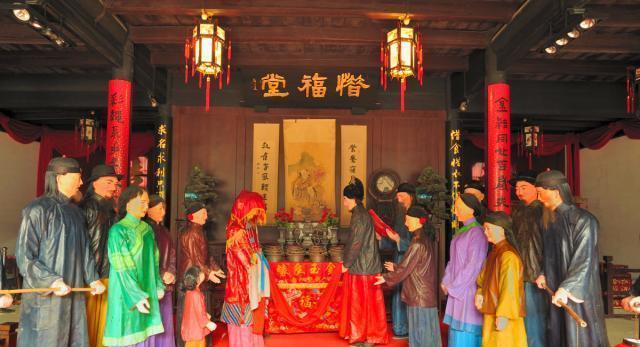We read all the lead to present a different history.
As we all know, in ancient China, women's status was generally relatively low, and they were often regarded as male vassals. The most emblematic of this is the popular millennium polygamous concubinage system, where all men with some money will marry several concubines to show their status. After the "Xinhai Revolution", this bad habit was not corrected in time, although the government vigorously promoted monogamy, but the basic people who controlled the regime were dictatorial warlords and former Qing officials, who were deeply influenced by traditional ideas, and the implementation of monogamy was just to conform to the trend of the times, shout slogans and make a show.

▲The wedding scene of the Republic of China period was restored
Therefore, during the Republic of China period, the trend of concubines was still prevalent, and many squire richmen and warlords followed the old practice of marrying several aunts and wives into the house to serve themselves. Yuan Shikai, the president, was even more "leading by example" and married a wife and a nine-room aunt. However, these aunts and wives were only low-status concubines after all, and under the polygamous concubine system, even the former emperor could only have one wife. For ordinary people, the wife of the main room is often married by the "parents' order of the matchmaker", and the procedure for taking concubines is relatively simple, just hire and send someone to marry, which shows that the status between wives and concubines is not equal, and the so-called concubines are only used to meet the personal needs of the head of the family or to achieve succession.
▲Old photo of President Yuan Shikai
On April 30, 1950, in order to further liberate women, New China promulgated the first Marriage Law, which clearly stipulated that "the feudal marriage system of arranged coercion, male superiority over female inferiority, and disregard for the interests of children shall be abolished." A new democratic marriage system with freedom of marriage between men and women, monogamy, equal rights for men and women, and protection of the legitimate rights and interests of women and children is introduced. That is to say, the new China legally put an end to the phenomenon of male overmarriage, so this has created a historical problem - where should many concubines and aunts and wives go before? Speaking of which, the solution is the envy of future generations.
▲The Marriage Act of 1950
The first thing to point out is that these aunts and wives were not swept out of the house by their wives overnight, and then died alone. Although the Marriage Act expressly provides for the introduction of monogamy, the Government has also made additional provisions that if the polygamous (concubine) life that was formed before liberation, if the wife and concubine do not file for divorce after the promulgation of the Marriage Law, the marital relationship can continue, but they may not marry again. That is to say, if the concubine and the aunt do not take the initiative to divorce the man, this polygamous concubine relationship can still be maintained, and the government will not forcibly cut it off.
▲Old photos of my aunt during the Republic of China period
In December 1952, Gu Da, vice chairman of the Guangdong Provincial Women's Federation, pointed out in his "Opinions on Publicizing the Marriage Law" that bigamy and concubinage are historical problems, and after the implementation of the Marriage Law, whether to divorce should be decided according to the requirements of women, and the man cannot be forced to leave the big or small. When the woman requested a divorce, the Government should approve it immediately and take care of her right to divorce. If the woman does not have such a request, she should still let them maintain the original relationship and live together. Such a solution can be said to be a great joy for everyone, and it has also made many modern people envious.
▲Macau Ruins of St. Paul's
However, there are still some parts of China that still have the phenomenon of polygamy and concubines, the most typical of which is Hong Kong, Macao and Taiwan. "Macau gambling king" Ho Hung-sin has four wives, in the face of the world's doubts, Ho Hung-sun on the pretext that the original wife has been bedridden for many years, and claimed that when he married his aunt's wife, Macao had not yet abolished polygamy (it was officially abolished in Hong Kong and Macao in the 1970s), and today's marriage law does not apply to him.
▲Ho Hung Sun family portrait
Other rich people in Hong Kong and Macao often use this as an excuse to unscrupulously marry their aunts, and some Hong Kong rich people even came up with the "Great Qing Laws" before Hong Kong's return to the motherland, which was refuted on this basis. However, after the death of these rich people, the competition between the aunts and wives of the houses and their heirs for family property is another great drama that is enjoyable, but fortunately, this bad habit has been completely abolished on the mainland, and this ridiculous drama will not be staged again.
Resources:
"History of Chinese Marriage", "Chinese Special History Library: History of Marriage in China"